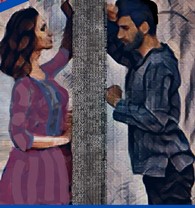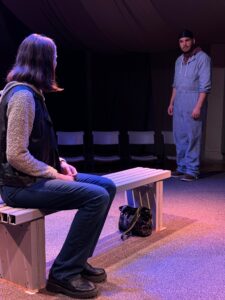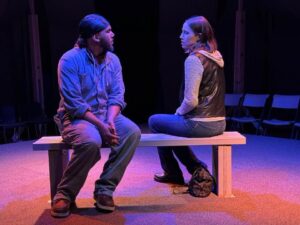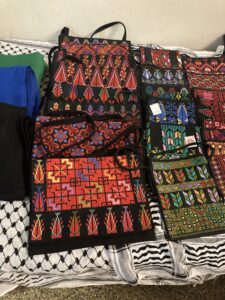Dunya Production’s The Return on Thursday, October 26 started with a message from Edward Mast, one of the writers of The Return. He asked for a short moment of silence for the lives lost during the Israeli-Palestinian conflict. He says that he got questions about whether he was going to cancel the run of The Return. He admits he thought about canceling the show, but didn’t, because there is always a war going on, and it is always important to be conscious about the state of the world.
The Return is about a Jewish girl (played by Anna Daines) who comes back to Israel to find her former lover (played by Tristan Johnson), who she had arrested 13 years ago for saying he was Jewish, even though he was Palestinian, then having consensual sex with her. Some of the main themes of the play are emotional closure and justice. The physical space of the venue is intimate and simple, but cozy.
Every scene takes place in an automobile repair shop where the man works. The first time the woman goes to visit the man, he pretends not to recognize her, and in a way, he doesn’t. After serving time in prison, he is like a different person. Now he uses a different name that sounds Jewish and he had his tattoo removed in prison, which was the name of his Grandmother’s village in Palestine.
The female character is grappling with her guilt. 13 years ago, she had him arrested for being Palestinian, she says. All he did was tell her he was Jewish, because if he had told her the truth, that he was Palestinian, she would have wanted nothing to do with him. When she found out the truth, she was shocked and her friends encouraged her to report him, so she did. 13 years later, after being in the U.S. for 8 years, she understands how the politics of her Jewish community convinced her that he did something wrong. Now, she is trying to find closure by asking for his forgiveness, but now he believes he did something wrong because he believes being Palestinian is wrong.
The nature of the crime is an efficient choice by the writers. The forbidden love story trope works extremely well when put against the backdrop of a country with its own unique issues. As someone who’s never lived in Israel, I initially thought the crime committed by the Palestinian main character was a false accusation because him and the Jewish girl had consensual sex. However, on further thought I realized that it could be perceived as non-consensual because if the Jewish girl knew he was Palestinian, she wouldn’t have sex with him. It’s obvious that The Return is no Romeo and Juliet. It shows an innocent true love that is choked and criminalized due to discrimination.
Tristan Johnson does an amazing job portraying his character’s discomfort in being Palestinian. The male character says he is Palestinian repeatedly, which causes him great distress. He explains that he should not be Palestinian, that by identifying as Palestinian and even saying the word Palestine is to renounce Israel, it’s a way of saying “We will be back,” it means war.
Although there is little set design, just a bench in the middle of the stage, The Return successfully conveys the discrimination the male character and other Palestinians face in Israel. For instance, at the beginning of the play the female character expresses her surprise multiple times that he is allowed to work on Israeli army jeeps at the repair shop. He explains that the repair shop has a contract with the army and that he is licensed to work on army jeeps. This shows how militarized Israel is; the repair shop he works at primarily repairs army jeeps. It also illustrates a very complicated situation for him. The female character expresses surprise that Israelis would trust a Palestinian to repair their army jeeps because a Palestinian may be liable to sabotage Israeli army jeeps. He reacts to this by telling her that he may call the police if she continues to loiter in the repair shop. She responds by saying, “Do you really think they would protect someone like you (a Palestinian man) from someone like me? (A Jewish woman)”
The Return tells many stories. It tells the story of a Jewish woman, her guilt, and her using her privilege to protect her Palestinian lover. It tells the story of a Palestinian man, his indoctrination into Israel, his renunciation of his ethnicity, and his reclamation of it. But most importantly, The Return tells the story of how Palestine became place of conflict and how the root of the issue is fear and prejudice. It’s a relevant play that is about justice and does an effective job at portraying its complex characters and setting. For those who are concerned, The Return is more than a forbidden love story. It’s a nuanced depiction of the Israeli-Palestinian conflict and how it affects everyone.
The Return is being shown in a building owned by a member of Dunya Productions and is being used as a community center. At the showing on Thursday, there was an Palestinian Embroidery (Tatreez) artist selling products like scarves, tote bags, and purses.
The Return Dunya Productions, 720 25th Ave, Seattle, WA. October 26-November 19 2023. With several performance nights selling out, Dunya Productions has added two extra performances of THE RETURN: 5:00 PM on Sunday November 12 and 5:00 PM on Sunday November 19.
Tickets: Dunyaproductions.square.site“>Dunyaproductions.square.site





















